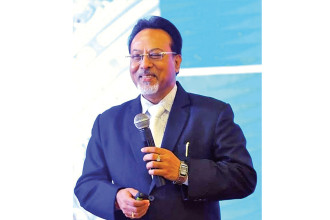
Carl Gershman is President of National Endowment for Democracy (NED), a nonprofit organisation funded by an allocation from Congress with the goal of promoting democracy worldwide. Also, US-based NED is one of the most active agents promoting freedom around the world. Prior to assuming the position with NED, Gershman was Senior Counselor to the United States Representative to the United Nations, in which capacity he served as the U.S. Representative to the UN’s Third Committee, which deals with human rights issues and also as Alternate Representative of the U.S. to the UN Security Council.
B360 caught up with Gershman when he was in Kathmandu to participate in an event titled, ‘Leveraging India-China Bilateral Relations’ hosted by Samriddhi Foundation during which he forwarded his analysis on the emerging trends in India-China bilateral relations. Excerpts:
Could you tell us a bit about the National Endowment for Democracy (NED) and about your work profile?
I have been serving as President of NED since it began operations in 1984. The organisation is funded by private organisations that have the purpose of advancing democracy throughout the world. Moreover, we are primarily a grant-making institution that supports NGOs in about 90 countries that are on the frontlines of the struggle for democracy. We also make grants to four ‘core institutes’ that are associated with the Democratic and Republican parties, the AFL-CIO, and the Chamber of Commerce. We have a research center that conducts meetings and conferences on critical issues. Besides, we established the World Movement for Democracy in New Delhi, India, in 1999, which is a global network of democracy activists. In addition, the NED has a quarterly academic journal, the Journal of Democracy, several fellowship programmes, and we regularly organise public events to show solidarity with democracy activists worldwide.
"It is an attempt to strengthen China’s geopolitical position and the countries that cooperate in this plan will have to be extremely careful with the way they can preserve their individual identity."
What brings you to Nepal?
We have been visiting countries to talk about democracy. Japan, South Korea, Taiwan and India are in our latest list. We were in India to also strengthen our relationship with the country, which is, apparently, the world’s largest democracy.
In context to Nepal, we were brought together here by two of Asia’s democracy network that we support; one of them being The Asia Democracy Research, which is a network of Asian researchers and institutions and the other is the network of Asian NGOs. They were here too so we met with them. Besides, I visited Nepal two years ago to speak at the first ever Subhash Darnal Award for Social Justice.
You were here two years back. What is your assessment of Nepal’s democratic progress today?
Well, I think it has a much stronger Central government today than it had two years back. This can provide stability but Nepal is a very unusual country, it is an emerging democracy and our only interest here is to encourage and push Nepal to stay on the democratic path. It has a strong civil society and it has a lot of problems to deal with to develop a really exclusive democracy. I am very encouraged that Nepal is now a stable democratic country than it has ever been in its history.
You have made presentations on Emerging Trends in India-China bilateral relations putting emphasis on cautioning Nepal about finding itself in compromised sovereignty. Considering this, should Nepal expand its relationship with China?
There are a number of policies that I talked about like the Belt and Road Initiative (BRI) and other policies such as the fortification of the island in the South China Sea, its use of short power to influence or shape opinions or sometimes even divide countries. China is also centralising power drastically and I regret to say more repressive towards decisions. When I was cautioning Nepal it was on the grounds of a stronger bargain with China.
I know Nepal wants to strengthen its relations with China economically but the experience of countries like Sri Lanka needs to be taken into account as well. Every time Sri Lanka’s former President, Mahinda Rajapaksa, turned to his Chinese allies for loans and assistance with an ambitious port project, the Chinese never disappointed him. Later, Rajapaksa was voted out of office in 2015 and Sri Lanka’s new government struggled hard to make payments on the debt he had taken on. After months of negotiations with the Chinese, the Sri Lankan government under heavy pressure handed over the Hambantota port and 15,000 acres of land around it for 99 years. The case is one of the most vivid examples of China’s ambitious use of loans and aid to gain influence around the world and of its stubborn strategy to play hardball to collect. It also is a stark illustration of how China and the companies under its control ensured their interests in a small country hungry for financing. The relationship between China and Sri Lanka had long been amicable, with Sri Lanka being an early recogniser of Mao’s Communist government after the Chinese Revolution. But it was during a more recent conflict — Sri Lanka’s brutal 26-year civil war with ethnic Tamil separatists — that China became indispensable.
The other countries like Pakistan, the Maldives are also troubled about the same. Talking about Burma, the nation is stepping back from its relationship with China to not fall into the same death trap that Sri Lanka fell into. On the other hand, some other countries are looking at how they can recover from some of the problems that are created by Chinese investment.
For instance, in Malaysia, the Muslim-majority nation was the fourth biggest recipient of Chinese overseas direct investment in 2017. The Chinese investment encouraged corruption and as a result, the Malaysian government lost the election, a reaction to corruption. Many countries are delicately handling its relationship with China as the nation has geopolitical ambitions. At the event, I was cautioning the people of Nepal to be careful as they go forward. I know they are going to build up their economic relations with China but they have to be very careful about protecting their sovereignty.
You also spoke about China’s technology transfer strategy and how it is using technology to penetrate and divide democratic societies. Could you expand on this and also tell us why this is different when other nations also practice use/misuse technology for their interests?
We published a report last September where we distinguished between soft power and sharp power. Soft power is a cultural influence and sharp power is political penetration. China’s economic success has generated both hard and soft power but within limits. A Chinese economic aid package under the Belt and Road Initiative may appear benign and attractive, but not if the terms turn sour, as was recently the case in a Sri Lankan port project.
In countries like Australia and New Zealand, China has gone very far into influencing internal developments. Further, the political contribution of China has also limited discussions about certain issues like Taiwan and Tibet. Well, Australia is slowly raising a red flag about China’s tactics. Allegations that China has been interfering in Australian politics, universities and publishing led the government to propose new laws to tackle “unprecedented and increasingly sophisticated” foreign efforts to influence lawmakers. Britain, Canada and New Zealand are also beginning to raise the alarm.
Certainly, there are other countries which are feeling the pressure of China with their access of economic influence.
Why do you think that the BRI which is among China’s key foreign policies and tool of geo-economic influence a threat to democracy?
I think the BRI is more than a development programme. It is unlike JICA (Japan International Cooperation Agency) - in Japan or the US - which promotes development consistently. BRI is Chinese geopolitical strategy and plan to influence the world. Largely, it covers 65 countries, 4.4 billion people and over a third of the world’s GDP. China is not doing this in a purely developmental view; it has geopolitical objectives in this. When we were in India, we were told that China is trying to hardwire most parts of the world, so that all roads reach to Beijing. It is an attempt to strengthen China’s geopolitical position and the countries that cooperate in this plan will have to be extremely careful with the way they can preserve their individual identity.
The United States is reportedly enduring military overreach, relative economic decline and domestic political gridlock and possible unpreparedness of meeting the challenges of China’s rise in power. Your thoughts.
There has been a change in US’s attitude towards China. For a very long time, people in the US believed that China’s economic growth is a very good thing. In fact, the entire political establishment in the US believed that it was a good thing because this would encourage China to become a more liberal state as other countries in East Asia like South Korea and Taiwan. To the surprise of many people, they discovered that China was not liberalising but in fact, increasing centralising power in the hands of the presidency ruled party. It was becoming a more repulsive and dangerous country. The economic growth didn’t lead to Chinese becoming more market-oriented economy. And in addition, China didn’t become a better neighbour but rather used the resources that it was able to acquire through economic growth to fund the BRI and other policies which would enforce Chinese influence. I believe many Americans are being more cautious about building a relationship with China.
What do you envision to be the negotiating points for Nepal in its balancing act between bilateral relations with China and India?
Nepal is dealing with two very different countries as its neighbours. China is larger than India economically and also stronger notably but the basic difference between these two countries is India is a democracy whereas China is a dictatorship. Even if China is professing globalisation alternatively it is seeking to Chinese influence and domination in the world and I think Nepal has to take that into account. Since Nepal is trading with China, it should examine and study the countries like Burma and Sri Lanka where China created turbulence. Nepal should be careful about not falling into a death trap with China.






